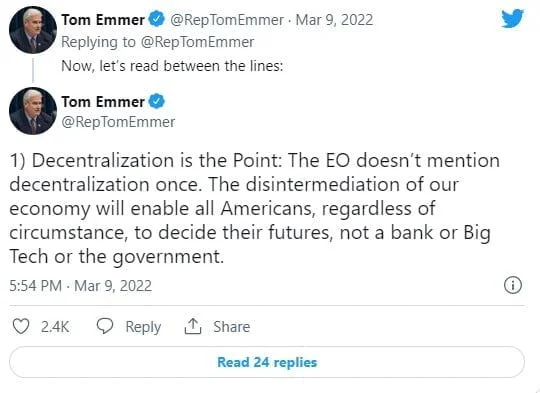President Joe Biden’s executive order, according to Tom Emmer, the U.S. Representative and Chair of the Blockchain Caucus, fails to mention decentralization directives even once.

Emmer believes in the disintermediation of the US economy, which would let all Americans, regardless of circumstance, make decisions about their own futures rather than a bank, Big Tech, or the government.
Tom Emmer Review Of The Executive Order
According to Emmer’s analysis, President Joe Biden’s “Executive Order on Ensuring Responsible Development of Digital Assets” directs multiple government agencies to investigate the benefits and hazards of digital assets to the US economy. The agency will also be in charge of researching global competitiveness and making legislative recommendations.
The Executive Order, on the other hand, makes no mention of decentralization. Reducing intermediaries in the US economy is critical for improving trust and boosting innovation, as the US has a national interest in supporting digital asset innovation.
For the past eight years, the nonpartisan Blockchain Caucus, co-chaired by Tom Emmer, has been pushing for pro-crypto legislation and supervision.
Crypto, tokenization, blockchain, NFTs, smart contracts, and stablecoins, he argues, are enabling a more viable economic framework with individual autonomy. It’s critical for the country to adopt a plan to stimulate crypto and blockchain technology innovation.
Highlighting other aspects of the Executive Order (EO), Emmer said:
“The EO places the “highest urgency” on the agencies to study CBDCs. Any commonsense analysis of a potential U.S. CBDC that is not open, permissionless, and private would illuminate that the very idea is an entire non-starter and a disservice to Americans.”
“The EO doesn’t ask the SEC to weigh in. SEC Chair Gensler has spent the past year intimidating crypto innovators and entrepreneurs with his unproductive regulation by public statement and enforcement action. His input is not critical.”
The rest of the EO is concerned with consumer protection, systemic risks, global competitiveness, international standards, and putting safeguards in place to ensure that code is resilient. The United States Representative agreed that bipartisanship is critical to preserving the crypto community in the United States and maintaining American leadership in technology and innovation.
“Overall, it’s critical to maintain tech and economic leadership on the global stage, and I look forward to continuing to work to find bipartisan solutions to keep our great crypto community right here in the United States.”

